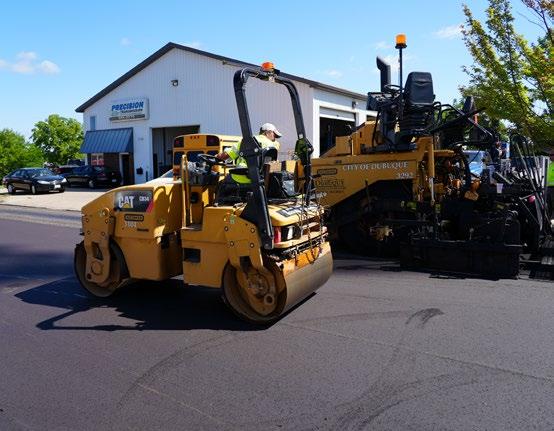
4 minute read
Getting There
Roads connect us to jobs, health care, education, entertainment, and other important aspects of life. You want to get to those important destinations as safely and efficiently as possible. That’s why the City of Dubuque is working to eliminate bumps in the road, literally and figuratively.
In 2020, the City of Dubuque Engineering Department and Public Works Department worked with the Iowa Department of Transportation (DOT) to perform a pavement condition assessment on numerous city streets. The assessment collected data on the condition of surface pavement and roadway structures to inform a path forward for improving Dubuque’s roadways.
Advertisement
8,091
segments City streets were divided into 8,091 segments to better pinpoint areas in need of improvement. The assessment found that 47% of pavement segments were in good condition, 47% were in fair condition, and 6% were in poor condition.
GOOD 47%
FAIR 47%
POOR 6%
With this data, the City developed a plan for the future of Dubuque’s roadways.
Some of Dubuque’s streets are the very first streets in the state of Iowa! This, along with our hilly landscape, present some challenges to road maintenance.

While it may seem that the logical place to start is repairing the roads in the worst condition, these streets are often in need of total reconstruction, which is an expensive and time-intensive process. Rehabilitation and preventative maintenance on streets completed before they reach a poor condition can sometimes prove less costly and save time and money for the City and taxpayers in the long-term. While the City’s streets budget is substantial, it is not enough to fund every repair needed. Constraints like available funding, time in a construction season, and the current labor market, force the City to prioritize which streets to address and what level of care to provide.

Repairing a street’s surface flaws is less costly than completely reconstructing it. It also takes less time and has less impact on residents and their commutes, making it an effective treatment method for roads in fair to good condition. The City rehabs roadways each year through its asphalt overlay program.
The existing surface pavement where isolated cracks appear is ground up by a process called asphalt milling. Asphalt is crushed and recycled into new material used to put a new layer on the roadway, creating a fresh, smooth surface. Repairing the road to this standard also allows for crews to prevent problems from getting worse through upkeep and maintenance. Some roadways at the end of their lifetime are past the point where rehab options are feasible, and it’s time for complete reconstruction of the street. This option makes major structural improvements to the road’s design and can lead to related improvements to structures in the area like utilities. All layers of the road are fully ripped out and replaced, which is costly and time intensive, but result in a brand-new road, with little maintenance needed, for years to come.
By the numbers: • $273,310 - Average cost of asphalt overlay treatment per mile. • 7-10 years - Average years added to extend to roads lifetime. • 5-10 miles - Annual average of miles improved through the asphalt overlay program. FALL 2022 | 4 Cedar Cross Road received a facelift from the City’s public works department as part of the 2022 asphalt overlay program.
By the numbers: • $2.376 million - Average cost of asphalt street reconstruction per mile. • 30-40 years - Average years added to extend to road’s lifetime.

The City is returning roadways to a state of good repair by prioritizing high-traffic roadways that maximize the overall impact to Dubuque’s street network. During this past construction season, over 10 miles on 44 of Dubuque’s streets were improved with asphalt overlay rehabilitation and are depicted in the map.
2022 Paving Project Locations Dubuque City Limits

Several roads received more intensive improvements. • Stoneman Road was completely reconstructed to provide a more accessible street for businesses and residents in the area, and a water main was relocated to improve capacity. • Chavenelle Road reconstruction was completed in 2022, connecting many in our community to jobs at Dubuque
Industrial Center West. • The Northwest Arterial State of Good
Repair Project reconstructed both the
Pennsylvania Avenue and Asbury Road intersections, repaved the southbound lanes, and total reconstruction of the northbound lanes began. The City is making data-driven decisions to identify future roadways in need of major improvements. Roads in very poor condition that the City plans to address as part of the engineering department’s 5-10 year reconstruction plans include: • North Grandview from Loras to
Auburn; • North Grandview between Kane and 32nd Street; and • select streets within the Embassy
West and Sunnyslope subdivisions.
Timelines and budgets are being planned accordingly to repair the sections of streets listed above. In the meantime, the City is rehabilitating and resurfacing street segments with the current available resources.

Stoneman Road was completely reconstructed during the 2022 construction season. This allowed for water main and storm sewer improvements to be made during the reconstruction process and resulted in improved accessibility and ease along the corridor. The same talented City crews that plow the snow in the winter work throughout the construction season and around the clock to resurface and repair our roadways – but potholes still pop up; it’s inevitable. Winter weather and snow plowing takes its toll on our roads, and when spring rolls around, the warmer daytime time temps paired with the overnight lows put stress on our streets. You can help us locate and repair potholes, by reporting them at










